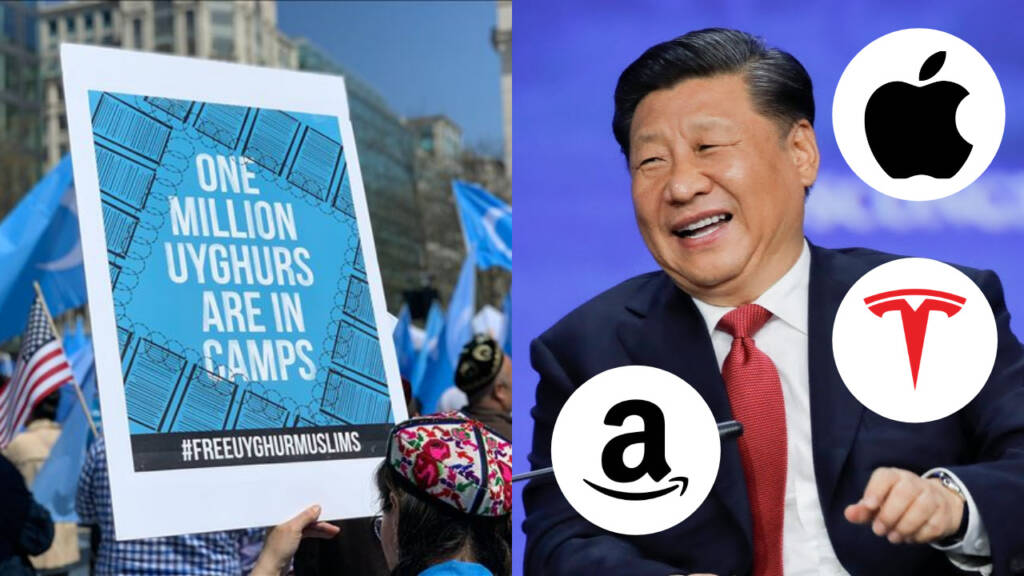The greed of minting money even when humanity is left at the altar of nowhere is the philosophy that the American Silicon valley gladly adheres to, and when called out, proclaims itself as the most sanctimonious one. According to news reports, it has been discovered that American companies like Apple, Tesla, and Amazon are using forced Uyghur labours for manufacturing goods and products in their factories.
According to The Washington Post report, Apple’s longtime supplier, lens technology has come under scrutiny for outsourcing its manufacturing work to the forced Muslim Uyghurs in its factories. The documents accessed by the Tech Transparency Project detail how thousands of Uyghur workers from the predominantly Muslim region of Xinjiang were sent to work for Lens Technology.
The revelations about Lens Tech suggest Apple’s involvement in China’s forced labor program are far deeper than the company has acknowledged. That may explain why Apple is quietly lobbying against the Uyghur Forced Labor Prevention Act.
— Tech Transparency Project (@TTP_updates) December 29, 2020
Reported extensively by TFI, Uyghur Muslims are the religious minority in the Xinjiang Province of China where Xi Jinping and his authoritarian regime have put millions of Uyghurs in concentration camps and undertaken unspeakable acts of violence and torture on them.
“Our research shows that Apple’s use of forced labour in its supply chain goes far beyond what the company has acknowledged,” said Katie Paul, director of the Tech Transparency Project.
The aforementioned company is one of the five firms that have employed the services of forced Uyghur Muslims in their factories. However, what makes Lens Technolgy stand out is the fact that the company has a well-documented history with Apple, going back to the early days of the iPhone.
After the revelation came to light, Apple instantly went into a damage control mode and served a good-for-nothing corporate jargon-filled cleanup statement.
“Apple has zero-tolerance for forced labour. Looking for the presence of forced labour is part of every supplier assessment we conduct, including surprise audits. These protections apply across the supply chain, regardless of a person’s job or location. Any violation of our policies has immediate consequences, including possible business termination. As always, our focus is on making sure everyone is treated with dignity and respect, and we will continue doing all we can to protect workers in our supply chain.” said Apple spokesman Josh Rosenstock.
Even if Apple tries to hush down the entire expose using its money-might, one cannot help but oversee the footprint of Apple and all such silicon valley companies that seem to benefit unacceptably from the cheap labour of destitute and helpless Uyghur Muslims.
Apple, Nike and Coca-Cola are among the companies lobbying Congress for changes in a bill that would ban goods made with forced labour in China’s Xinjiang region. Apple has been subtly batting around Capitol Hill to water down the bill so that its profit margins are not compromised. The bill, currently in the Senate, if passed, would impose restrictions on imports of items tied to forced labour in Xinjiang, among other things.
Even a China-owned New York Times was forced to pen an article criticising Apple and other companies for trying to weaken the bill.
Read more: China threw lavish parties for big global media outlets so that CCP’s propaganda flowed freely
“Lobbyists have fought to water down some of its provisions, arguing that while they strongly condemn forced labour and current atrocities in Xinjiang, the act’s ambitious requirements could wreak havoc on supply chains that are deeply embedded in China,” the Times wrote.
While the American corporates continue to support China and its human-rights violation acts, American President Donald Trump is steadily marching to clamp down completely on CCP and its unethical treatment of Uyghurs.
As reported by TFI, it was President Donald Trump who had signed the ‘The Uyghur Human Rights Policy Act, 2020’ which is primarily aimed at cornering China. The bill signed by Trump paves the way for the American authorities to impose sanctions on the CCP officials who are directly involved in the atrocities committed on the Uyghur Muslims.
Earlier, the Trump administration had banned cotton, hair products, computer components, and some textiles from China’s Xinjiang province which are made “using forced labour”.
Apple needs to come clean on the issue and instantly shift its allegiance towards suppliers that do not employ the services of Uyghur Muslims. However, with a Pro-China media-President elect seemingly inching towards the White House, it looks highly unlikely that Apple will be reprimanded for its actions.
